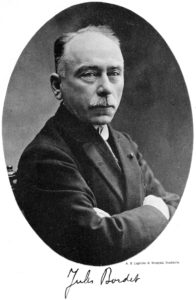Article No. 305
18 December 2019
Before 2019 comes to a close the opportunity is taken to acknowledge the work of another clinical researcher who contributed ultimately to the understanding of aHUS or Complement Mediated Thrombotic Microangiopathy.
One hundred years ago in 1919 the Nobel Peace Prize for Physiology or Medicine was awarded to Jules Bordet.

Jules Jean Baptiste Vincent Bordet was Belgian. He was born in 1870 in Soignies , he studied at the University in Brussels and later worked at the Louis Pasteur Institute in Paris.
There his research interest was the immune system.
His key discovery was that in addition to the acquired antibodies in the blood there was something else which helped destroy bacteria.
He had discovered an innate component in the blood which was a part of the immune system that had not been acquired.
He called it “Alexine”.
It was a defensive protein.
It later became known as “Complement”
He found that it had the ability to destroy foreign blood cells by a process known as haemolysis.
His studies led to other discoveries about blood including tests for diseases and blood types.
And over a century later to the discovery in 1998 that a mutation in a control components of Complement can cause the dysregulation which results in aHUS.
The 1998 research group who made that discovery included another Belgian, Professor Yves Pirson of the Cliniques St. Luc la Clinique des Maladies Rénales Génétiques, Brussels.
Today’s Complement researchers now hold the torch that was lit by Bordet. His torch was lit by those came before him including Louis Pasteur.
And so hopefully it will go on so that one day all affected by aHUS ,or cTMA, will no longer be affected.
That will be a good day.
More information about the life and works of Jules Bordet can be found on the Institute Jules Bordet website click here.

